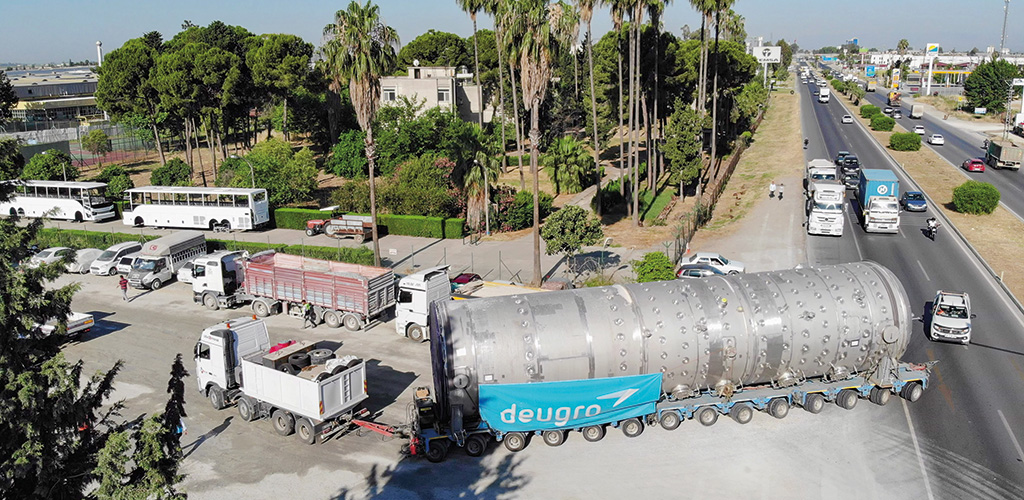Nov 04 | 2020
Executive Vice President Tim Killen on how deugro group has adjusted to meet the challenges of the pandemic

 Q: Has your company experienced any sourcing issues or bottlenecks on projects this year, and do you anticipate any coming up in the near future?
Q: Has your company experienced any sourcing issues or bottlenecks on projects this year, and do you anticipate any coming up in the near future?A: We have all faced unprecedented challenges due to the impact of Covid-19 and the global economic fallout, which has been felt throughout the global project logistics industry.
Every mode of transportation has been affected and has experienced disruptions and volatility, including longer transit times and higher rates.
Some routes were completely unavailable due to ports and borders closures, which also led to a regional imbalance of equipment. Initially, as the pandemic began to arrive in Europe, there was an increasing trend to shift critical project equipment from ocean to air transportation where possible. The air freight market was hugely affected for an extended period of time due to the fact that about 80 percent of passenger aircrafts were grounded. There was substantial shortage of belly aircraft capacities, which in turn led to much longer lead times and substantially increased freight costs — up to five times higher than usually expected.
Nevertheless, early in 2020 we saw positive forecasts for the global project market, and deugro started the year with a strong project pipeline covering a diverse range of industries. For those projects already in execution, we needed to focus on ensuring that we could design and deliver solutions to both the operational and the business continuity challenges we face.
Q: Have these been resolved, or have you found a way to work around them?
A: Moving project cargo during the global Covid-19 pandemic has been more challenging than ever, requiring our technical specialists to provide the utmost focus on safety, security, vendor management, schedule, and commercials to provide end-to-end delivery for our clients. This has been a mammoth effort, but we have successfully managed to keep cargo moving over the last six months by working together with all our partners in the project logistics supply chain to ensure we can manage safety, schedule and commercial challenges together. Working hard to identify and predict risk, then taking the correct, decisive actions to help mitigate as much of the impact of the current situation as we can to deliver success and safety.
For example, in the air freight market, the past months have been extremely busy and interesting for us. The landscape of pricing and aircraft availability was changing quickly, and we were working day and night to keep our finger on the pulse of the rapidly changing situation. deugro has created transfer routing solutions, for example from Far East via Europe to Latin America, to compensate for temporary suspensions of several carriers and/or to reduce costs compared with the limited available routings from the origin markets.
The air freight market remains critically important, to support the urgent movement of cargo while many regular supply chains are disrupted. Especially, for ongoing oil and gas projects, we see increasing demand for air cargo as an expedited solution to close the gap caused by Covid-19 disruptions that affected production schedules and traditional transport routes. We might see similar dynamics when some of the projects that have been delayed or put on hold return to active stages.
Q: What changes to your procurement and operational policies have you implemented as a result of the pandemic?
A: deugro continues to focus on the safety and security of our employees, clients and partners, to follow our own high-quality standard, yet Covid-19 has severely impacted logistics supply chains globally. The deugro organization continues to maintain business operations, fulfill urgent demands, and manage the operational and commercial challenge faced against an environment of uncertainty and significant business disruption across the globe.
We have concentrated our efforts on managing supply disruptions from our top tier suppliers, while initiating new short-term sourcing processes to meet the demands faced due to supply constraints and commercial volatility. We are now proactively looking at the medium-term supply base, driving cost savings, commitment and security of supply by working intelligently and collaboratively with our partners to build a stronger and more resilient businesses for the future.
Q: Are you seeing any trends among your customers as a direct result of the pandemic and has it affected the way in which they interact with you?
A: We are likely to see a significant effect on capital investment decisions in new projects, across multiple industries and being delayed or canceled. Going forward, the project landscape will be different; investors and operators will take a much more cautious approach in their commercial spending and risk taking.
For most logistics companies it will be very difficult to plan and predict what the business environment will look like in 2021 and beyond. Most companies must deal with many uncertainties, as most industries remain fickle until such time the global pandemic is manageable. At the same time, we see a lot of geopolitical unstableness which adds to already challenging times.
As we experienced following the 2014-2015 oil crisis, there were opportunities for smaller and lower-risk projects with independent developers to secure positive investment decisions. It was when these projects moved forward that it provided the project cargo industry opportunities, while also assisting to raise confidence in the market at the same time.
As the oil and gas industry may continue to be heavily impacted by low demand and lower commodity rates, industries supporting a lower carbon future, such as power, renewables, infrastructure and mining, will likely gain investment momentum and growth in the post-Covid-19 world.
With a focus on renewable energies we see increasing activities in the Far East and the Americas, especially in the offshore industry. The power industry today is a mature market for freight forwarders to operate in, however there are still areas where added value can be provided. By investing time, energy and experience to understand client needs and the challenges of industry verticals, project freight forwarders can provide solution-focused, safe and cost-effective expertise in project logistics. It is the role of the freight forwarder to manage the challenges in logistics along the supply chain by detailed engineering studies, operational planning, and risk analysis from beginning to end of the project life cycle. deugro provides a fully integrated, highly technical, safe and secure project solution to clients’ cargo while maintaining control and visibility every step of the way.
Q: Have you seen a slowdown in any types of orders or projects compared with others?
A: In the oil and gas sector, Covid-19 has caused substantial economic slowdown globally. In combination with the oil production war between Russia and Saudi Arabia, this has led to the oil price hitting US$25 dollars per barrel, the lowest it has been for more than two decades. We hear from multiple clients in the oil and gas industry that many large projects are being delayed, cancelled or put on hold.
We are seeing a clearly visible trend in oil projects, which appear to have been hit harder and have not just suffered a temporary demand shock. Many energy producers have adjusted their long-term oil price outlook, writing off huge amounts of their exploration and production assets.
At the same time, we at deugro group are seeing a steady flow of positive news from our clients regarding liquid natural gas (LNG) and chemical projects. Our unparalleled track record with shore-based and floating LNG projects keeps us busy. Our strategic efforts to pursue projects in Africa seem to be very welcome by our clients.
Image credit: deugro group
